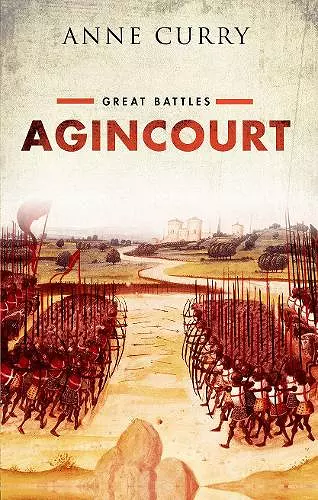Agincourt
Great Battles Series
Format:Paperback
Publisher:Oxford University Press
Published:23rd Sep '21
Should be back in stock very soon

Anne Curry explores the significance of the Battle of Agincourt, examining its historical context, cultural legacy, and enduring influence on national identity from Shakespeare to modern times.
In Agincourt, Anne Curry delves into one of the most significant battles in English history, exploring its impact and the enduring legacy it has cultivated over the centuries. The book offers a comprehensive examination of the Battle of Agincourt, fought in 1415, highlighting not only the events of the battle itself but also how it has been memorialized in culture and history. Curry, a leading expert on the subject, investigates the reasons behind the battle's prominent place in the collective consciousness, from Shakespeare's portrayal to its influence on modern interpretations.
Curry begins by setting the historical context of the battle, discussing its role within the broader scope of the Hundred Years War. She traces the immediate reactions to Agincourt, revealing how both English and French perspectives shaped the narrative surrounding the event. The author then transitions to the battle's representation in literature and media, particularly focusing on Shakespeare's Henry V and its various adaptations, including the notable 1944 film that coincided with World War II. This analysis illustrates how Agincourt has been reimagined through different lenses, reflecting the changing sentiments of each era.
Furthermore, Curry examines the cultural appropriation of Agincourt over time, noting how it has been invoked to express national identity and pride. From the 18th century onwards, the battle became a symbol of English valor, inspiring works of art and music. The emergence of the Agincourt archer as a representation of English freedom during the Victorian period underscores the battle's lasting significance. Even today, historians continue to engage with the battle, demonstrating its ongoing relevance in discussions of English heritage and identity.
Review from previous edition Anne Curry analyses the evidence with the authority of the doyenne of Agincourt historians ... [an] excellent narrative of the fighting. * Lawrence James, The Times *
Nobody knows more about Agincourt than Anne Curry... Her new work addresses the reasons for Agincourt's enduring fame. Clearly, much of it was down to Shakespeare, who was at his roaring best when he dramatized Henry Vs day of triumph in the late 1590s, a time when the English public was especially hungry for cod-medieval jingo. What is less well known, but illustrated beautifully by Curry's book, is the fact that the immortalisation of Agincourt started long before Shakespeare. * Dan Jones, The Sunday Times *
Interesting, commendably accessible, and admirably well researched. * Susan Elkin, Independent on Sunday *
Curry compiles an exhaustive list of Agincourt's resonance throughout French and British letters and art, and she is especially incisive on the 600th anniversary of the battles about its evolving and often ambiguous message to the sometimes allied, sometimes warring French and British. * Victor Davis Hanson, Times Literary Supplement *
Gives a good account of Agincourt's after-life in Shakespeare's Henry V, and in myth, legend, literature and propaganda ... * Malcolm Vale, London Review of Books *
Wonderfully accessible ... By exploring English history from a truly intriguing angle, Curry's insightful book shows us how the myth of Agincourt, harnessed by jingoism, has been used to convince the country on repeated occasions of its own invincibility. Fascinating stuff. * Tim Williamson, History of War *
Entertaining and readable. * Francesca Trowse, Military History *
If one accepts that fact can be separated from fiction, Curry's Agincourt can hardly be bettered. * Oxford Journals: French History *
What can one learn from a 600-year-old battle? Quite a bit, as it turns out. Anne Curry's telling of the Battle of Agincourt, and her analysis of English King Henry V's leadership in that battle against the French, yields new insights not just about the battle itself, but about how the memories and myths that surround it have influenced both personal and national identities. * Survival: Global Politics and Strategy *
does an admirable job of showing how national identity, myth-making, and popular culture can influence the historical narrative ... * New York Journal of Books *
This is as much a book for the non-specialist as for the historian or enthusiast. Professor Curry writes in a style that is eminently readable. Highly recommended. * Geoffrey Carter, The Battlefield Trust Magazine *
There are many books about Agincourt, but few authors can claim to have contributed as much to the subject as the industrious Anne Curry. * Society of Antiquaries of London Online Newsletter (SALON) *
Forget Laurence Olivier or Kenneth Branagh, or even Shakespeare, and instead feast on this historical extravaganza which tells how the battle was fought, how the protagonists lined up and what was actually achieved by the great victory. * Northern Echo, Steve Craggs *
Curry is fascinating both on how Shakespeare adapted his source material for Henry V and on how the battle, our perceptions often governed by Shakespeare, has been used, often for propaganda, right through to the present day. * The Stage, Susan Elkin *
Anne Curry's brilliant historiographical discussion traces how the myth of Agincourt and the image of a small but doughty force prevailing against incredible odds have become in no small part because of Shakespeare embedded in our national consciousness. Having written on Agincourt before, Curry knows the scholarly debate well... [A] fascinating account of the battle and its mythology. * Literary Review, Mary Wellesley *
splendid * Chris Green, Suffolk and Norfolk Life *
ISBN: 9780199681020
Dimensions: 215mm x 136mm x 16mm
Weight: 336g
272 pages